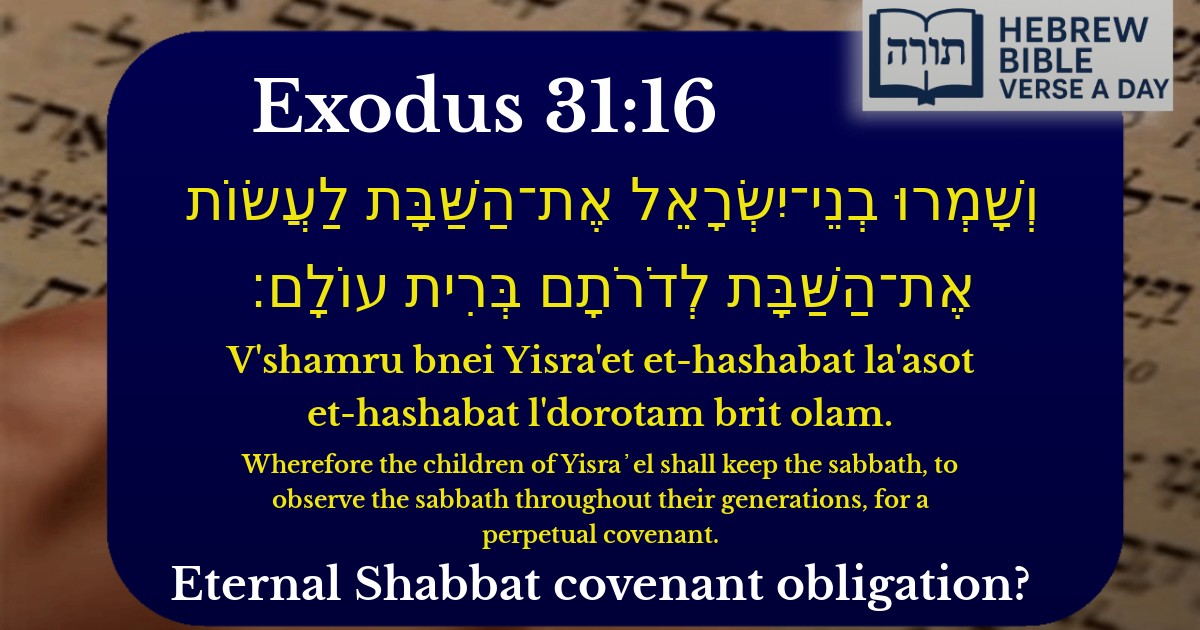Join Our Newsletter To Be Informed When New Videos Are Posted
Join the thousands of fellow Studends who rely on our videos to learn how to read the bible in Hebrew for free!
Hebrew Text
וְשָׁמְרוּ בְנֵי־יִשְׂרָאֵל אֶת־הַשַּׁבָּת לַעֲשׂוֹת אֶת־הַשַּׁבָּת לְדֹרֹתָם בְּרִית עוֹלָם׃
English Translation
Wherefore the children of Yisra᾽el shall keep the sabbath, to observe the sabbath throughout their generations, for a perpetual covenant.
Transliteration
V'shamru bnei Yisra'et et-hashabat la'asot et-hashabat l'dorotam brit olam.
Hebrew Leining Text
וְשָׁמְר֥וּ בְנֵֽי־יִשְׂרָאֵ֖ל אֶת־הַשַּׁבָּ֑ת לַעֲשׂ֧וֹת אֶת־הַשַּׁבָּ֛ת לְדֹרֹתָ֖ם בְּרִ֥ית עוֹלָֽם׃
וְשָׁמְר֥וּ בְנֵֽי־יִשְׂרָאֵ֖ל אֶת־הַשַּׁבָּ֑ת לַעֲשׂ֧וֹת אֶת־הַשַּׁבָּ֛ת לְדֹרֹתָ֖ם בְּרִ֥ית עוֹלָֽם׃
🎵 Listen to leining
Parasha Commentary
📚 Talmud Citations
This verse is quoted in the Talmud.
📖 Shabbat 118b
The verse is referenced in a discussion about the importance of observing Shabbat and its eternal covenant.
📖 Yoma 85b
Cited in the context of the sanctity of Shabbat and its observance as a perpetual covenant.


The Eternal Covenant of Shabbat
The verse (Shemot 31:16) emphasizes the perpetual nature of Shabbat observance for Bnei Yisrael. Rashi explains that the phrase "לְדֹרֹתָם" (throughout their generations) teaches that Shabbat is an everlasting mitzvah, binding upon all future generations without interruption. The term "בְּרִית עוֹלָם" (perpetual covenant) underscores that Shabbat serves as an eternal sign between Hashem and the Jewish people.
Shabbat as a Divine Sign
Rambam (Hilchot Shabbat 30:15) elaborates that Shabbat is not merely a day of rest, but a testimony to Hashem's creation of the world in six days and His resting on the seventh. The Mechilta adds that observing Shabbat demonstrates our belief in Hashem as the Creator and our acceptance of His sovereignty.
Two Aspects of Shabbat Observance
The Unbreakable Bond
The Sforno notes that Shabbat serves as an unbreakable bond between Hashem and Klal Yisrael, similar to the covenant of milah. The Midrash (Bereishit Rabbah 11:8) states that Shabbat protested before Hashem that all other mitzvot have partners (e.g., tzedakah has the poor), but Shabbat stands alone - to which Hashem responded that Klal Yisrael would be its eternal partner.